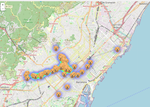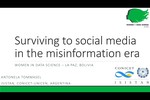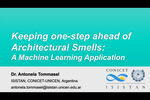Antonela Tommasel
Researcher at CONICET
CONICET
Universidad Nacional del Centro de la Provincia de Buenos Aires
Biography
I'm Antonela Tommasel. I'm currently a Researcher at CONICET , working in the Recommender Systems group at ISISTAN Research Institute in Tandil, Argentina. I'm also an Adjunct Professor at UNICEN .
My main research interests include social computing applications of machine learning and recommender systems.
8+ years of research experience. 11+ years of teaching experience.
Interests
- Social Computing
- Recommender Systems
- Social Media
- Fake News
Education
-
PhD in Computer Sciences, 2017
Universidad Nacional del Centro de la Provincia de Buenos Aires
-
Bachelor in Software Engineering, 2012
Universidad Nacional del Centro de la Provincia de Buenos Aires










